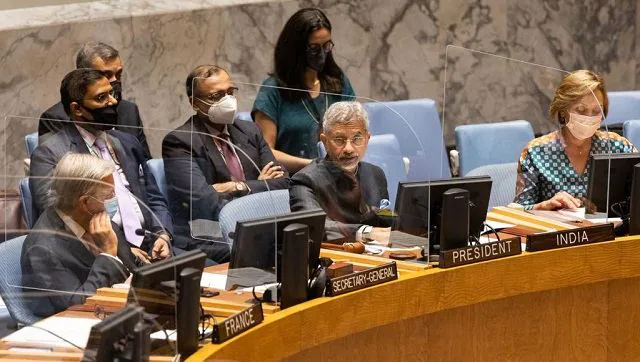Following Afghanistan very closely, says S Jaishankar at UNSC
At the United Nations Security Council meeting on “threats to international peace and security caused by terrorist acts”, external affairs minister S Jaishankar on Thursday said New Delhi is carefully following the developments in Afghanistan and India’s focus is on ensuring the security and safe return of Indian nationals.
Jaishankar, addressing reporters after chairing an open-debate on peacekeeping under India’s Presidency at the UNSC, said that the “events unfolding in Afghanistan have naturally enhanced global concerns about their implications for both regional and international security.”
“In our own immediate neighbourhood, ISIL-Khorasan (ISIL-K) has become more energetic and is constantly seeking to expand its footprint. The heightened activities of the proscribed Haqqani Network justifies this growing anxiety,” he said.
Jaishankar pointed out to “state hospitality” being extended to those with innocents’ blood on their hands, adding that none should lack the courage to call out their “double-speak”.
“Let us always remember that what is true of COVID-19 is even more true of terrorism: none of us are safe until all of us are safe,” he said.
Jaishankar has discussed the situation in Afghanistan in his bilateral meetings in the United Nations, including with UN Secretary General Antonio Guterres.
He arrived in New York on Monday as the UN Security Council held an emergency meeting on the situation in Afghanistan, the second time in just over the 10 days that the UN body met under India’s Presidency for the month of August to discuss the situation in the war-torn country.
What Jaishankar said:
- In an apparent jibe at Pakistan without naming the country, the external affairs minister also said, “Whether it is in Afghanistan or against India, groups like Lashkar-e-Taiba and Jaish-e-Mohammed continue to operate with both impunity and encouragement.”
- “It is, therefore, vital that this council does not take a selective, tactical or complacent view of the problems we face. We must never countenance sanctuaries for terrorists or overlook their raising of resources,” he said.
- Responding to a question on India’s investments in Afghanistan over the last two decades and whether New Delhi will be engaged in Afghanistan now that the Taliban is in control, he said: “You used the word investment. I mean, for us, it reflected what was a historical relationship with the Afghan people.”
- “I think that relationship with the Afghan people obviously continues and that will guide our approach to Afghanistan in the coming days. At this time, as I said, these are early days. Our focus right now is on ensuring the safety and security of Indian nationals who are there,” he said.
- Asked whether India has had any communication with the Taliban in recent days, Jaishankar said: “At this point of time, we are looking at what is the evolving situation in Kabul.”
- “Obviously, the Taliban and its representatives have come to Kabul so I think we need to take it on from there,” he said without directly responding to the question.
In the meet, Jaishankar also reiterated an eight-point action plan to fight terror:
- Summon the political will: don’t justify terrorism, don’t glorify terrorists
- No double-standards. Terrorists are terrorists; distinctions are made only at our own peril
- Don’t place blocks and holds on listing requests without any reason
- Discourage exclusivist thinking and be on guard against new terminologies and false priorities
- Enlist and delist objectively, not on political or religious considerations
- Recognise the linkage to organised crime
- Support and strengthen the FATF
- Provide greater funding to UN Office of Counter Terrorism
He also urged the UNSC to “end the stalemate preventing the adoption of a Comprehensive Convention on International Terrorism, which India has championed for so long.”
Following his meeting with Guterres in the UN headquarters on Tuesday, Jaishankar had tweeted: “Good to meet UN Secretary General @antonioguterres. Our discussions focused on Afghanistan, following upon the Security Council meeting yesterday.”
Jaishankar also discussed the “latest developments in Afghanistan with US Secretary of State Antony Blinken and underlined the urgency of restoring airport operations in Kabul.
State department spokesperson Ned Price said that Blinken spoke with Jaishankar on Wednesday about Afghanistan and the developing situation.
Jaishankar said he also discussed the evolving situation in Afghanistan with French minister for europe and foreign affairs Jean-Yves Le Drian.
“We will continue to coordinate in the UN Security Council. Thank him for evacuating 21 Indian nationals from Kabul to Paris,” he added.
India on Tuesday rushed back home its ambassador Rudrendra Tandon and staff from the embassy in Kabul in a military transport aircraft following escalating tension, fear and uncertainty gripping the Afghan capital after the Taliban insurgents seized the Afghan capital on Sunday.
The C-17 Globemaster aircraft of the Indian Air Force carrying around 150 people, including diplomats, officials, security personnel and some stranded Indians, landed at the Hindon airbase near the National Capital at around 5 pm after a brief halt at Jamnagar in Gujarat, in the wake of escalating tension, fear and uncertainty gripping the Afghan capital after its takeover by the Taliban two days back.
It was the second evacuation flight as another C-17 aircraft brought back around 40 people from the Hamid Karzai International (HKI) Airport in Kabul on Monday as part of India’s emergency evacuation mission that was carried out following coordination with relevant authorities including US officials handling security at the airport in the Afghan capital.
With inputs from agencies



